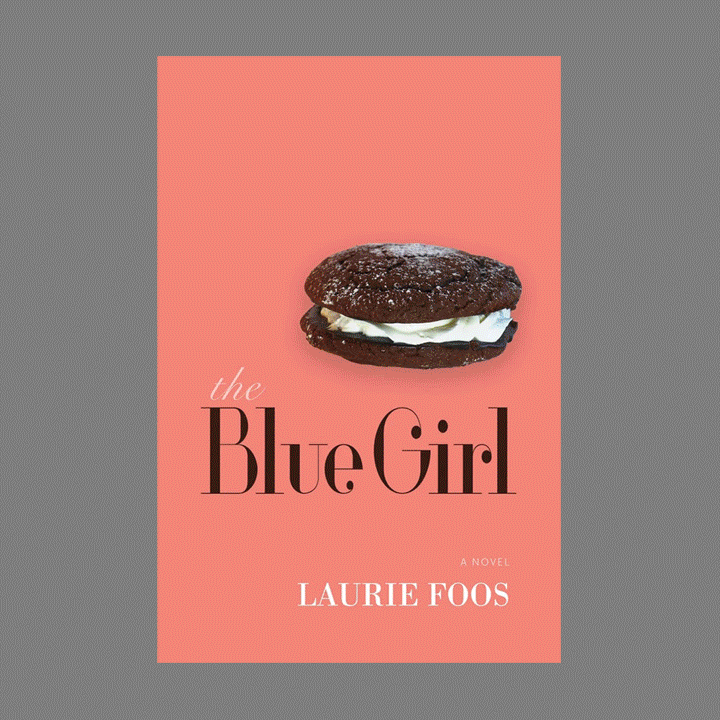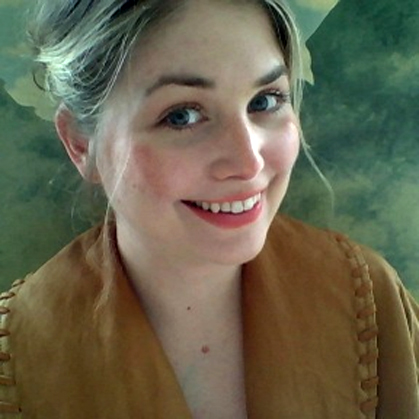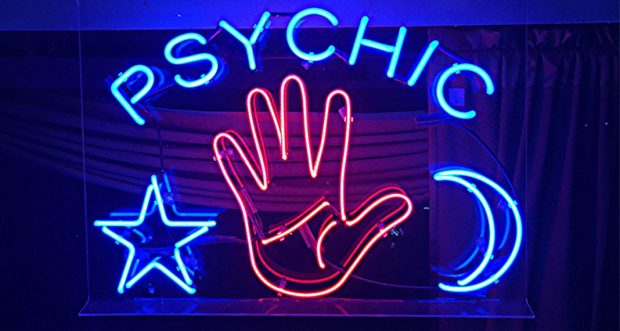USEREVIEW 005: Writers as Psychics

Books are prophetic in Deirdre Danklin‘s fiction-form experimental review set in a psychic convention, but the books’ predictions reveal more about themselves than they do about their customer coming to have her fortune told. You don’t want to miss this strange little powerhouse review of 8 entire books.
#CAROUSELreviews
Remember conventions? Lily Dale is full of psychics. Held in an old Victorian mansion, this convention has no humming fluorescent lights, no inky brochures, no laminated ID badges swinging from lanyards. It’s all rippling shawls and misty unease. Tables and booths and even some closets full of psychics willing to tell you what’s ahead. The murmurings of other people’s futures fill the space. I walk in, sign my name anxiously and turn left. The books I read this month are waiting among the milling crowd to tell me my future.
The Blue Girl by Laurie Foos is waiting for me in a hammock. She’s fresh-faced and wholesome, but there’s a pallor to her skin like maybe the hammock is swinging underwater. She says the future is full of secrets. Secrets you hide from your family, especially your children, especially your teenage daughters. You don’t hide these secrets from yourself, you make them concrete, real and invent ways of disposing of them. Sticky sweet woman’s ways, but they never get taken away. Not wholly. Not really. I thank her. She’s made me a little nauseous but in a pleasantly true way. Her eyes are the blue of chlorinated water. I’m not uneasy, not yet. Moving on.
The next table is a flimsy card table. The Heart of a Dog by Mikhail Bulgakov is wearing a rumpled gray suit and seems to be sleeping. His head is tipped back and I can see all of his pointed teeth. I clear my throat and his head snaps forward. He looks at me through vodka- bloodshot eyes. Your future is full of patterns set out by the society in which you live, he says. There’s no way around who you will become and no way to change the amount of power you’ve been allotted. Okay, but how much power? I ask. You know, he says, so why are you asking me? You already know who you are in this structure and maybe that makes you uncomfortable? Maybe you’d rather have a dog than a man? He’s looking at me with a wolfish mouth, his eyes focused on my calves. He’s right, but he scares me.
Wild Life by Kathy Fish waves me away from the card table. She’s across the room in a treehouse built into the Victorian staircase. Vines twine from her hands. She has the face of a stone icon in my grandmother’s garden. Your future is full of ups and downs like life is full of ups and downs, she says. This is not the advice people come all the way to Lily Dale to hear, but it’s probably the truest advice in the room. There are beautiful moments, though, she says, smiling. There are beautiful moments of connection and disconnection. Even your pain will be beautiful if you pay close enough attention. Like life, she says, everything is brief. I want to stay in her treehouse, but I paid an entrance fee and I’m determined to get my money’s worth. I open my mouth to thank her, but Wild Life waves me away as if she knows what I’m going to say and that I haven’t really heard her.
Zazen by Vanessa Veselka is leaning against a counter. Stray cooked lentils pile up at her feet. She’s yawning. The future is the apocalypse, she tells me. The future is late capitalism’s worst aspects grown huge like radioactive cockroaches and set upon the world with razor teeth. She slowly folds up a vegan burrito as she tells me this. Its crumbling insides spill out and she sweeps them off the counter to the floor. The future is dead rats marked with Buzz Lightyear dolls in cemeteries we feel bad about but never maintain. The future is all of your best intentions— no plastic, vegetarianism — not being enough, in the end, to save a goddamned thing. I want to ask her why this future seems to bore her, but she takes a big bite of her burrito and I just stand there and watch her chew.
The Death of Vivek Oji by Akwaeke Emezi is surrounded by people taking pictures with their phones. The flashes draws my attention. They are glowing, explaining to the crowd that death isn’t the end of the communication. This, precisely this, is why everyone has come. We all want to feel that we can be as transcendent as The Death of Vivek Oji, that they are going to bestow some of their beauty onto our heads. The future is sad, sometimes, they say. And the future is misunderstood, sometimes. But that doesn’t mean that the future isn’t shifting, changing under our feet as I speak. The future is love, they say, with a smile that blinds us, the future is love without scraping to make that love understandable to the world. In the future, maybe, Vivek Oji lives.
One booth over, How to Be Both by Ali Smith stands under several medieval oil paintings of sorrowful women. She shifts, he shifts? The point is the shifting. Tights, pantaloons, short-cropped hair, thick, colored paints. The future, the girl painter says, is art. The future, the girl named George says, is creation. Your art is your future, How to Be Both says with two mouths at once. When you have created inside of you, the rest is just puzzle pieces scattered by the wind. We are not bound by society’s expectations, the girl painter says, nor death. We are bound only by the limits of what we can create. We are also bound, the girl named George says, to those we love, fiercely, even after they leave us. But that’s the point, the girl painter says, arguing even as she smiles fondly at the girl named George. They never leave us.
The Iliac Crest by Cristina Rivera Garza agrees. I hear her jangling bones across the hall. She’s reclining on an old physician’s table, staring up at the ceiling with eyes as dark as sockets. The future is our history, she says. Her jaw is unhinged, but the words flow out like the wind whipping down a seaside cliff. She’s a skeleton. She’s whole. You can’t understand the future unless you understand the trauma of the past, all of its bones. She laughs at her own joke. I want to ask her to name every bone. I have a feeling that even lists are haunting coming from her. The future never comes, not really, she whispers. It is just moments, repeated moments, lives, repeated lives, in an asylum by the sea. Then, she opens her jaw wider and I hear the roar of the ocean and the cries of sea birds. I edge my way down the hall, the taste of salt on my tongue.
Plot by Claudia Rankine is waiting at the end of the hall just before the exit into the back garden. Over her shoulder, I can see people with their hands on their knees staring at flowers, wondering what’s real. Are you thinking about having children? Plot asks me. Her voice is gentle, soothing, kind. Her words are well-chosen and bright as crystal. I am, I say. Well, children are, in a way, the future, she says. The act of creating them is at once an act of love and an act of violence. Are you going to help me decide? I ask, but Plot only laughs, her beautiful, perceptive eye, pointed up at the ceiling. I can see how everything is going to work out for your family, she says. I can see the love and the blood and the words and the deaths that are coming, but I won’t tell you. Thank you, I say. That’s a relief. Not knowing is a relief. She nods and motions for me to walk out into the light of the garden.
The Blue Girl by Laurie Foos (Coffee House Press, 2015)
ISBN 978-1-56689-399-2 | 220 pp | $15.95 USD
The Heart of a Dog by Mikhail Bulgakov / trans. Michael Glenny (Penguin Random House, 2013)
ISBN 978-161219-288-8 | 144 pp | $15.95 USD
Wild Life: Collected Works from 2013-2018 by Kathy Fish (Matter Press, 2018)
ISBN 978-099615-582-3 | 109 pp | $15 USD
Zazen by Vanessa Veselka (Red Lemonade Press, 2011)
ISBN 978-1935869054 | 264 pp | $15.95 USD
The Death of Vivek Oji by Akwaeke Emezi (Penguin Random House, 2020)
ISBN 978-0525541608 | 256 pp | $27.00 USD
How to Be Both by Ali Smith (Penguin Randon House, 2015)
ISBN 978-030727-525-7 | 336 pp | $16.95 USD
The Iliac Crest by Cristina Rivera Garza (Feminist Press, 2017)
ISBN 978-155861-435-2 | 200 pp | $16.95 USD
Plot by Claudia Rankine (Grove Atlantic, 2001)
ISBN | 112 pp | $16 USD


